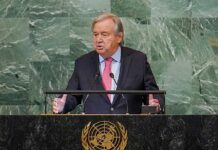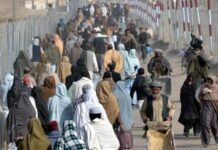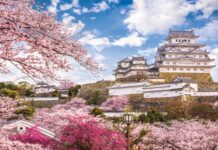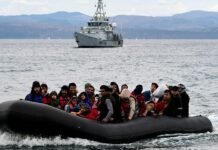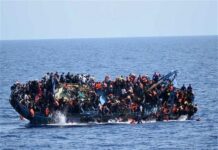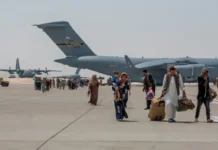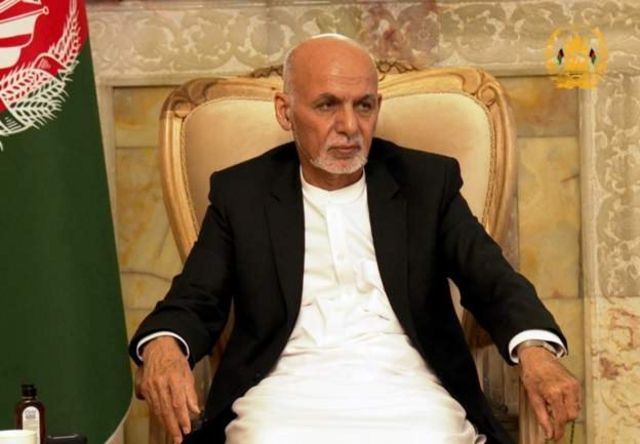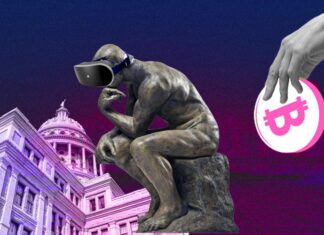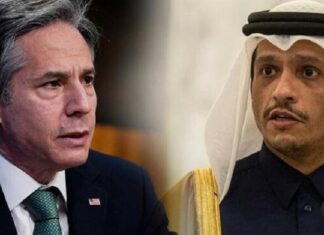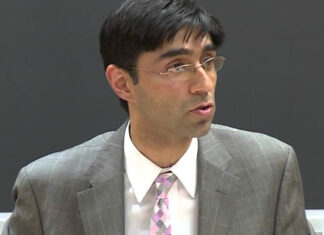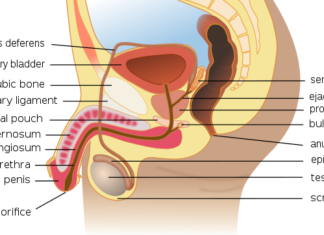Mohammad Ashraf Ghani :
Mohammad Ashraf Ghani Ahmadzai (born May 19, 1969) is an Afghan politician and economist and former President of Afghanistan. He was elected President of Afghanistan in the elections of September 20, 2014 and September 28, 2019. He was the fourteenth President of the Islamic Republic of Afghanistan from September 29, 2014 until his escape on August 15, 2021. He previously served as Afghanistan’s finance minister from 2002 to 2004 under President Hamid Karzai. He was also a candidate in two presidential elections in 2009 and 2014.
Before returning to Afghanistan in 1987, Ghani traveled to Pakistan to conduct field research and briefly conducted field research in refugee camps and religious schools. He then became a professor of anthropology at Johns Hopkins University, where he continued his work at the World Bank. From July 2002 to December 2004, he led Afghanistan’s economic endeavor as finance minister after the fall of the Taliban government.
Took over.
Mohammad Ashraf Ghani is the founder of the Institute for Government Effectiveness, an organization founded in 2005 to improve the ability of governments to serve their citizens. He gave a Ted talk in 2005 on how to rebuild broken nations like Afghanistan. In 2013, in an online poll, he was ranked in the top 50 of the world’s top 100 intellectuals. The poll was conducted by Foreign Policy Magazine, and in a similar poll conducted by Prospect magazine, he won second place.
Ashraf Ghani was ranked fourth in the 2009 presidential election in Afghanistan and in the 2014 election with 37.6 percent of the vote. Abdullah Abdullah To win the votes of the people of Afghanistan, however, Abdullah’s protest against the election results led to a recount of all votes cast, which was finally followed by the signing of an agreement to form a national unity government between the two candidates, Ashraf Ghani Ahmadzai as president. The Islamic Republic of Afghanistan and Abdullah Abdullah were appointed Chief Executive Officers.
Family
Ashraf Ghani is from the Gholzai Pashtuns and from the Ahmadzai tribe. He was born in 1328 in Logar province / south of Kabul. His father’s name was Shah Pasand, and according to some accounts he was a young employee of a transportation company in Kabul, and in the 1980s he continued to work in a number of trucks in Pakistan. His mother was named Kokbeh (nicknamed Ziagol) and the daughter of Ahmad Ali Ludin (Ludin is a Pashtun tribe in Afghanistan, mostly living in Logar and eastern Afghanistan, some of whom have settled in the southwest and Herat and speak Persian). Was. While studying in Lebanon, he met his future wife, Rula, and married her to a Lebanese Christian girl. Ghani and Rola’s two children, Maryam and Tariq, were born in the United States and are all considered US citizens.
Education
Ashraf Ghani completed his primary education in Logar province and graduated from Habibia High School. He went to Lebanon to study at the American University of Beirut and earned a bachelor’s / master’s degree / master’s degree in political science from the American University of Beirut. Became a teacher. In 1977, after receiving a scholarship to continue his studies, he went to Columbia University in New York and obtained his second master’s / master’s degree in international relations from the same university; A year after the People’s Democratic Party came to power in Afghanistan, many of his family members were imprisoned. Ghani remained in the United States and received his Ph.D. in Cultural Anthropology from Columbia University. His doctoral dissertation was entitled “Production and Domination: Afghanistan, 1747-1901” . He also holds two honorary doctorates; One is from Scranton University in the United States “in 2007” and the other is from the University of Guelph in Canada “in 2008”.
World Bank
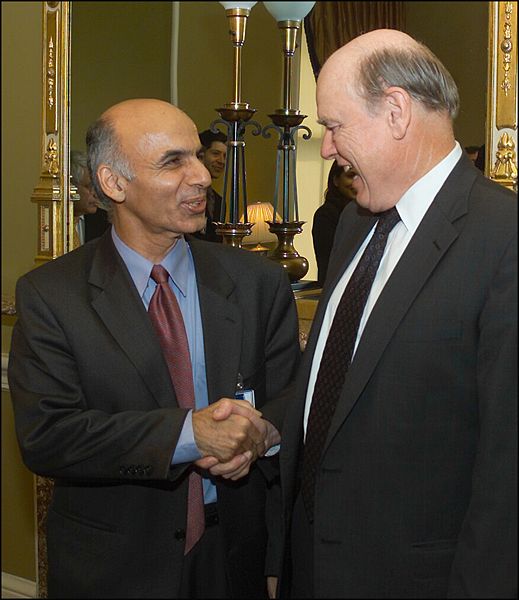
US Treasury Secretary John Snow meets with Afghan Finance Minister Dr. Ashraf Ghani to discuss the progress of economic reconstruction in Afghanistan. 2004
After graduating in 1983, Ashraf Ghani was invited to teach at the University of California, Berkeley. He has worked as a guiding anthropologist at the World Bank since 1991, advising on the human dimension of economic programs and participating in World Bank programs in East Asia, South Asia, Russia, China, and India.
United Nations
Ashraf Ghani was appointed Special Adviser to Akhzar Ibrahimi, the UN Secretary-General’s Special Representative for Afghanistan, in 2002. His most important activity in this position was cooperation in the design, negotiation and implementation of the Bonn Agreement, which defined the role of the Afghan government after the fall of the Taliban.
Nomination of the Secretary-General of the United Nations
In late 2006, Ghani became the next UN Secretary-General to succeed Kofi Annan. He told the Financial Times in response:
I hope to win, I was introduced through my ideas.
“Carlos Pescual of the Brookings Institution praised Ghani:” Extremely rich intellect, talent and capacity make him Secretary-General of the United Nations after Kofi Annan. “
In 2005, Ghani delivered a speech at the International Law Symposium of the American Bar Association, the Transatlantic Policy Network, the Annual Norwegian Government Development Officers’ Meeting, the CSIS Meeting on UN Reform, and the UN-OECD-World Bank Meetings in Fragile Countries. He has contributed articles and political analysis to the Financial Times, the International Herald Tribune, the Los Angeles Times, the New York Times, the Wall Street Journal, and the Washington Post.
Political activities
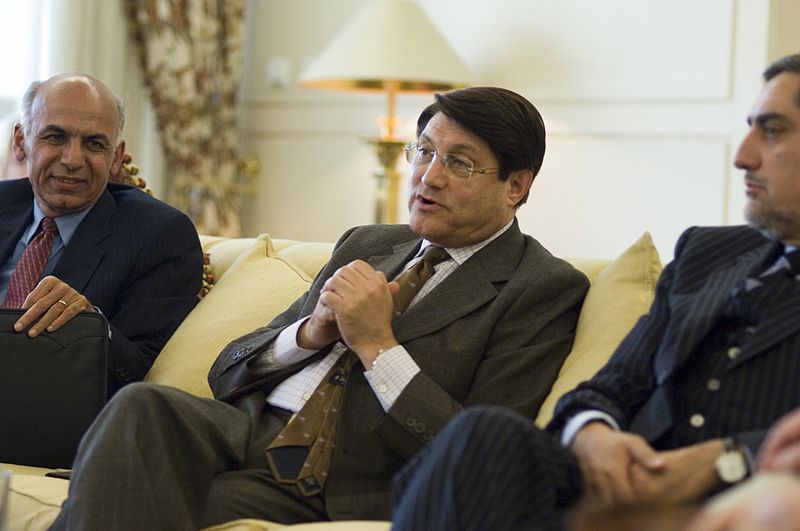
Ashraf Ghani quit his job at the World Bank after 9/11 and began working with various news networks and newspapers.
Ghani returned to Afghanistan in December 2001 and on February 1, 2002, was appointed Senior Advisor to President Hamid Karzai, Minister of Finance, and Head of the International Aid Coordination Office. He resigned from the government in 2004 and was elected president of Kabul University.
After leaving Kabul University, Ghani founded the Government Effectiveness Institute with Claire Lockhart, who later became its president. [12] The institute proposed a framework in which governments must perform ten functions to better serve their citizens. The framework was discussed by post-war transition leaders at a September 2005 meeting sponsored by the United Nations and the World Bank.
Minister of Finance of Afghanistan
He made extensive reforms, including issuing new currencies, computerizing Treasury operations, establishing a single Treasury account, adopting a balanced budget policy and using the budget as the main policy tool, concentrating revenue, reforming tariffs, and overhauling customs. He established regular reporting to the Cabinet, the public and international stakeholders as a tool for transparency, accountability and the prevention of corruption, and required donors to focus on three areas: improvement, accountability to government counterparts, and the development of a strategy. Focus on development to make Afghans more responsible for their future development.
Eradicating poverty through wealth creation and citizenship rights was at the heart of rich development programs. The National Solidarity Program currently covers 13,000 of Afghanistan’s 20,000 villages, as introduced by Ghani. [13]
Afghanistan 2009 presidential election
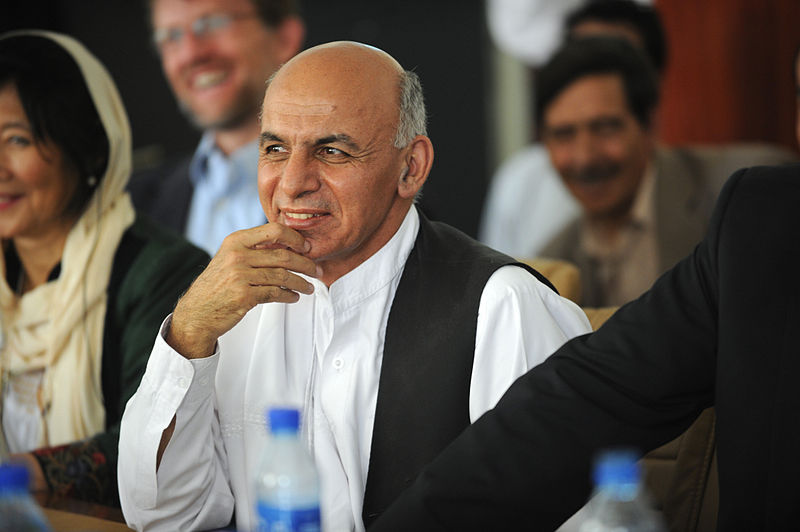
Ghani visits Panjshir province, 2011
In January 2009, an article by Ahmad Majidiar was published by the American Enterprise Institute, listing Ghani as one of the 15 possible candidates for the 2009 Afghan presidential election. On May 8, 2009, Ashraf Ghani was nominated for the 2009 presidential election. Afghanistan is a candidate. Rich campaigns focused on: good governance; A dynamic economy and job opportunities for the Afghan people. Unlike other key candidates, Ghani called on Afghans living abroad to fund his campaign. Ghani’s first deputy was Mohammad Ayub Rafiqi; He appointed James Carville, a well-known campaign strategist for Bill Clinton, as his campaign adviser.
During the second term of President Hamid Karzai in 2010, Ashraf Ghani became responsible for the program of transferring security responsibilities from external forces to internal (local) forces.
Presidential
Afghanistan Presidential Elections 2014
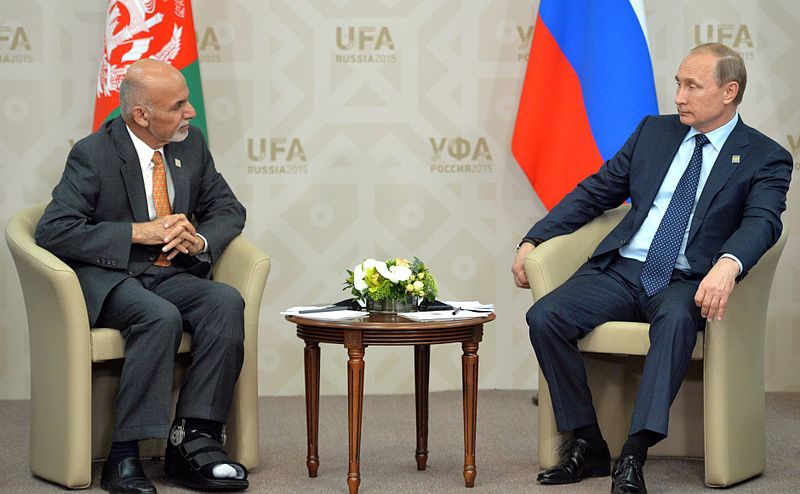
President Ghani meets with Vladimir Putin in UEFA, Russia, 2015 Image taken from www.kremlin.ru
Ashraf Ghani participated in the presidential election for the second time in 2014. In this election, Abdul Rashid Dostum, the famous Uzbek warlord, was the first deputy and Sarwar Danesh, the Minister of Higher and Professional Education, was the second deputy. The National Front led by Pir Ahmad Gilani, the National Salvation Front led by Sebghatullah Mojaddedi and the Movement of the Islamic Revolution led by Musa Khan Hotak and the Islamic Party led by Azizullah Din Mohammad were among the most important currents supporting Ashraf Ghani in this election.
Based on the results of counting 10% of votes; Ghani came in second with 37.6% of the vote after Abdullah Abdullah and ran against Abdullah in the second round. Ashraf Ghani generally won more votes in the eastern provinces / provinces and some northern provinces / provinces and Pashtuns and Uzbeks, and in the provinces / provinces of Paktia, Nangarhar, Farah, Jawzjan, Faryab, Nimroz, Helmand, Zabul, Logar. Kunar, Laghman and Takhar were in the first place.
Ashraf Ghani won 56.44% of the Afghan vote in the second round of the race against Abdullah Abdullah. If the first results of the second round of elections are confirmed, Ashraf Ghani Ahmadzai will be considered the President of Afghanistan.
But according to Ashraf Ghani Ahmadzai’s supporters in the provinces / provinces of Paktika and Paktia, they cheated in his favor more than the population there, which led to Abdullah Abdullah not officially recognizing the IEC and launching civil protests. Madani continued until the Independent Election Commission (IEC) announced Mr. Ashraf Ghani as the winner in the second round of announcing the preliminary results, and at the same time Mr. Abdullah’s rival Mr. Abdullah decided to announce his government and his supporters were waiting in the hall. The Grand Assembly (Loya Jirga) convened, but Mr. Abdullah asked his supporters for a few days when he was opposed by his supporters.
Abdullah’s efforts to ask for time did not materialize until she recounted her behind-the-scenes remarks, saying that US Secretary of State John Kerry was scheduled to travel to Afghanistan on Friday to break the deadlock.
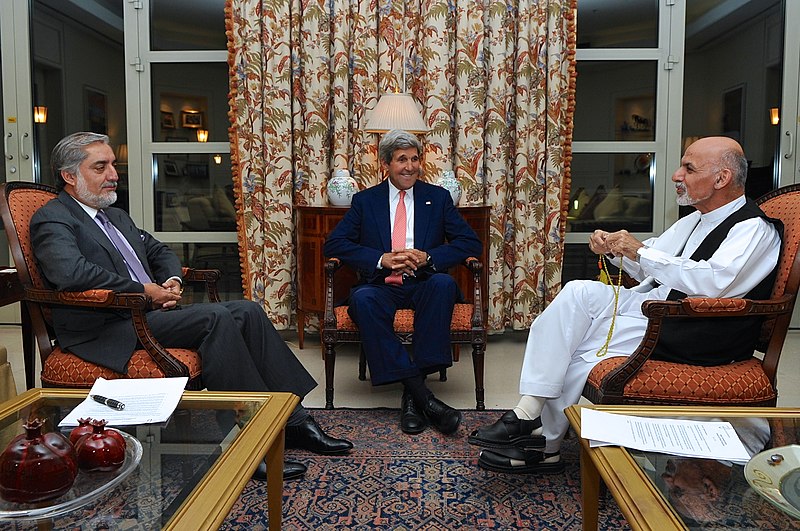
U.S. Secretary of State John Kerry sits with Afghan presidential candidates Abdullah Abdullah, left, and Ashraf Ghani, right, at the U.S. Embassy in Kabul, Afghanistan on July 12, 2014, after he helped broker an agreement on a technical and political plan to resolve the disputed outcome of the election between them.
Image taken from United States Department of State website
Just as Mr. John Kerry came to Afghanistan on Friday and met with both candidates and a separate commission, and it was decided that all the votes in the June 24, 2014 elections would be considered, the polls were conducted. Establishment of a national unity government; Ashraf Ghani Ahmadzai was appointed President of Afghanistan and Abdullah Abdullah was appointed Chief Executive Officer of the National Unity Government.
Afghanistan Presidential Election 1398
Mohammad Ashraf Ghani, along with Amrullah Saleh and Sarwar Danesh, ran for the presidency on January 20, 2017. He called his constituency “state-building.” Be.
Escape from Afghanistan and the end of the presidency !
Ashraf Ghani fled Afghanistan on August 15, 2021, following the Taliban’s approach to Kabul, ending his presidency. Following Ashraf Ghani’s departure from Afghanistan. Creating a power vacuum, Abdullah Abdullah, chairman of the Supreme National Reconciliation Council, Gulbuddin Hekmatyar, chairman of Hezb-e-Islami Afghanistan, and former President Hamid Karzai, formed a coordinating council for peace and peaceful transfer of power. Suddenly, Ashraf Ghani from Afghanistan, Abdullah Abdullah, said: “The former president of Afghanistan left Afghanistan and put the country and the nation in a state, go and God will count with him.” In this regard, General Bismillah Mohammadi, Minister of Defense of Afghanistan “They tied our hands behind their backs and sold the homeland, damn the rich and the gang,” he wrote in a Twitter message. This speculation was not officially confirmed by the Taliban, and some news agencies, as well as Gulbuddin Hekmatyar, ruled out the formation of such a government.
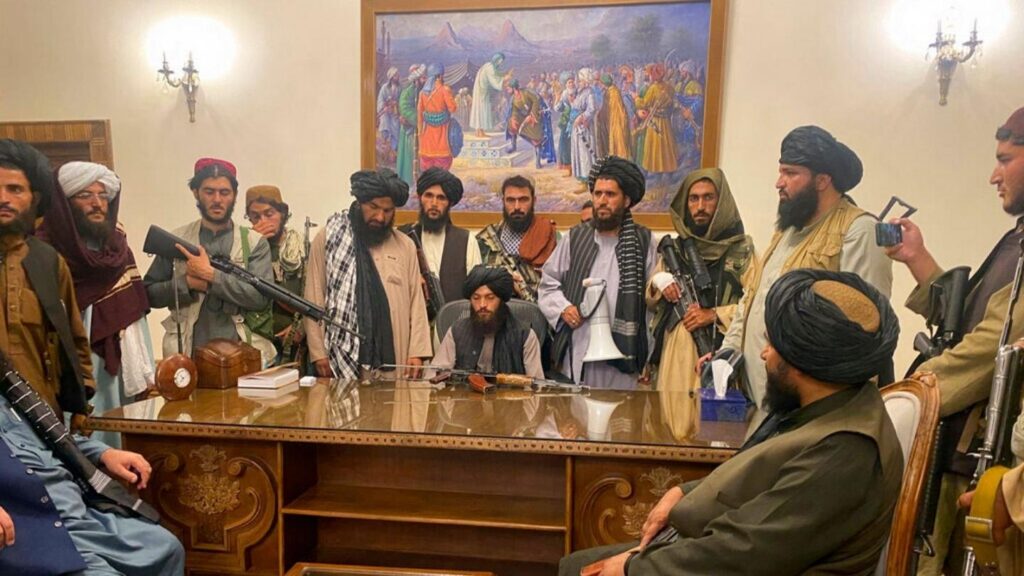
Ashraf Ghani’s functions for Afghanistan
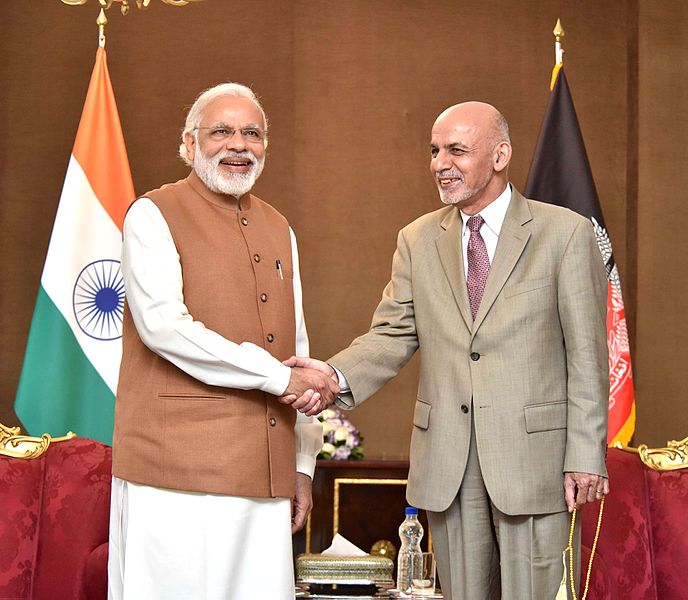
President Ghani with Narendra Modi
Economy and trade
During his tenure, Ghani strengthened ties with neighboring countries and Central Asia, such as Uzbekistan, and concluded several trade agreements to boost bilateral trade. [29] [30]
1 Concluding an agreement on the use of the Chabahar port with Iran, which would allow Afghanistan to trade with India without the need for Pakistani territory.
2 Concluding the Khaf-Herat Railway Agreement, which was completed in 2020, will reduce transit times between Iran and Afghanistan.
3 Concluding an agreement to connect the port of Aqina to the railway line of Turkmenistan in 2017. This agreement is part of the Azure Road Agreement.
4 Concluding the Lapis Lazuli Transport Corridor in 2017, which connects Afghanistan to the Caucasus, the Black Sea and then Europe. This agreement reduces Afghanistan’s logistical needs for Iran and Pakistan.
5 Casa-1000 hydropower transmission from Central Asia to Afghanistan in 2017.
6 TAPI Gas Pipeline Transmission (TAPI), 2017.
7 Construction of Kamal Khan Dam in southern Afghanistan In 2021, Kamal Khan Dam will green the fertile plains of southern Afghanistan and prevent Helmand water from entering Iran. Ghani in response to the Iranian government for the water supply of Helmand said:
We do not give water for free; Give us oil to give you water.
Ghani said at the inauguration of the Khan Steel plant in Kabul in January 2018 that his goal was to make Afghanistan a major exporter of steel in the region.
Ashraf Ghani’s relations with Pakistan
Since the election, he has sought to improve Afghanistan’s relations with Pakistan to begin peace talks with the Taliban. His first meeting with Pakistan was on December 14, 2014, when he met with Pakistani Prime Minister Nawaz Sharif. After several terrorist attacks that the perpetrators considered to be Pakistan and the failure of the peace talks, he severely strained his relations with Pakistan. After the two attacks of the Haqqani Network and the Taliban in Kabul (2018), Ghani called Pakistan the center of Taliban support. TOLOnews quotes unnamed sources as saying that Ashraf Ghani did not answer the Pakistani Prime Minister’s phone call. But Afghanistan’s ambassador to Pakistan, Omar Zakhilwal, denies the allegations.
Relations with the Taliban
Since the beginning of the Afghan peace process in 1397, the government has always demanded that Afghans be at the center of negotiations with the Taliban and preserve the achievements of the past twenty years, especially the republic against the Emirate, which is one of the ideals of the Taliban. Ashraf Ghani released 5,000 Taliban prisoners under external pressure, especially Donald Trump, following an agreement between the Taliban and the United States to withdraw foreign troops and form the Afghanistan Peace Consultative Loya Jirga (2009).
Afghan media reported on Sunday, August 15, 1400, that Ashraf Ghani had left the country for Tajikistan following a 12-day Taliban invasion and occupation of the city by Taliban forces before capturing the capital.
Comments
The signing of a peace agreement with Gulbuddin Hekmatyar, one of the armed opponents of the Afghan government, is one of Ashraf Ghani’s functions.
Ashraf Ghani implicitly opposes the re-emergence of former Mojahedin leaders in Afghan politics; During his two terms in office, he challenged the power of all non-Pashtun political leaders. He ousted Mohammad Karim Khalili Hazara, secretary general of the Islamic Unity Party of Afghanistan, from his post as chairman of the High Peace Council; He ousted Ata Mohammad Noor Tajik, the 10th governor of the Jamiat-e-Islami Party of Afghanistan, who was governor of Balkh. Ishchi’s case discredited him and he fled to Turkey, dismissing General Murad Ali Murad Hazara, the chief of staff of the Afghan Armed Forces, for helping Abdul Rashid Dostum’s ambush by the Taliban.
He removed many non-Pashtun cabinet ministers from office; He fired Abdul Razzaq Wahidi, Minister of Communications and Technology of Afghanistan. The next leaked information was that he was fired because he was a Hazara. And introduced petroleum to the Afghan Supreme Court for embezzlement.
Ashraf Ghani reluctantly accepted the award of Marshall rank to Abdul Rashid Dostum and considered it based on expediency and not meritocracy; He did not attend the award ceremony, which is considered the highest military rank in Afghanistan’s military hierarchy.
Leaving Afghanistan
Mohammad Ashraf Ghani left Afghanistan on August 15, 2021, following a Taliban attack on key cities and the successive surrender of Afghan cities. Abdullah Abdullah (chairman of the National Reconciliation Council) also confirmed this. Initially, it was said that his destination country was Tajikistan. Until it was finally officially announced that he had gone to the UAE.
In an interview with Pakistan’s Geo Channel, Khalil Rahman Haqqani said that the Taliban had pardoned Afghan President Ashraf Ghani and asked him to return to the country if he wished.




